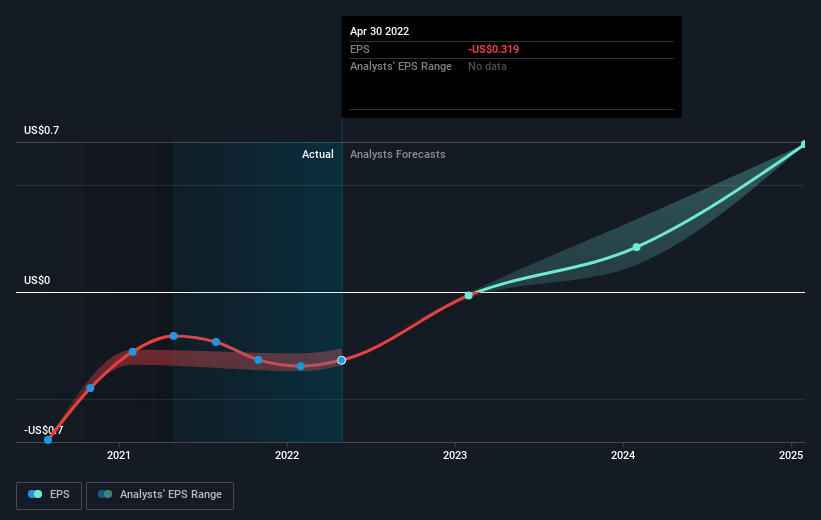Analysts Expect Breakeven For Box, Inc. (NYSE:BOX) Before Long
We feel now is a pretty good time to analyse Box, Inc.'s (NYSE:BOX) business as it appears the company may be on the cusp of a considerable accomplishment. Box, Inc. provides a cloud content management platform that enables organizations of various sizes to manage and share their content from anywhere on any device. With the latest financial year loss of US$54m and a trailing-twelve-month loss of US$48m, the US$3.8b market-cap company alleviated its loss by moving closer towards its target of breakeven. Many investors are wondering about the rate at which Box will turn a profit, with the big question being “when will the company breakeven?” We've put together a brief outline of industry analyst expectations for the company, its year of breakeven and its implied growth rate.
View our latest analysis for Box
Consensus from 9 of the American Software analysts is that Box is on the verge of breakeven. They expect the company to post a final loss in 2023, before turning a profit of US$33m in 2024. The company is therefore projected to breakeven around 2 years from now. How fast will the company have to grow each year in order to reach the breakeven point by 2024? Working backwards from analyst estimates, it turns out that they expect the company to grow 58% year-on-year, on average, which signals high confidence from analysts. Should the business grow at a slower rate, it will become profitable at a later date than expected.
Given this is a high-level overview, we won’t go into details of Box's upcoming projects, but, take into account that typically a high growth rate is not out of the ordinary, particularly when a company is in a period of investment.
One thing we would like to bring into light with Box is its debt-to-equity ratio of over 2x. Generally, the rule of thumb is debt shouldn’t exceed 40% of your equity, which in this case, the company has significantly overshot. A higher level of debt requires more stringent capital management which increases the risk in investing in the loss-making company.
Next Steps:
This article is not intended to be a comprehensive analysis on Box, so if you are interested in understanding the company at a deeper level, take a look at Box's company page on Simply Wall St. We've also compiled a list of pertinent factors you should look at:
Valuation: What is Box worth today? Has the future growth potential already been factored into the price? The intrinsic value infographic in our free research report helps visualize whether Box is currently mispriced by the market.
Management Team: An experienced management team on the helm increases our confidence in the business – take a look at who sits on Box’s board and the CEO’s background.
Other High-Performing Stocks: Are there other stocks that provide better prospects with proven track records? Explore our free list of these great stocks here.
Have feedback on this article? Concerned about the content? Get in touch with us directly. Alternatively, email editorial-team (at) simplywallst.com.
This article by Simply Wall St is general in nature. We provide commentary based on historical data and analyst forecasts only using an unbiased methodology and our articles are not intended to be financial advice. It does not constitute a recommendation to buy or sell any stock, and does not take account of your objectives, or your financial situation. We aim to bring you long-term focused analysis driven by fundamental data. Note that our analysis may not factor in the latest price-sensitive company announcements or qualitative material. Simply Wall St has no position in any stocks mentioned.

 Yahoo Finance
Yahoo Finance 
